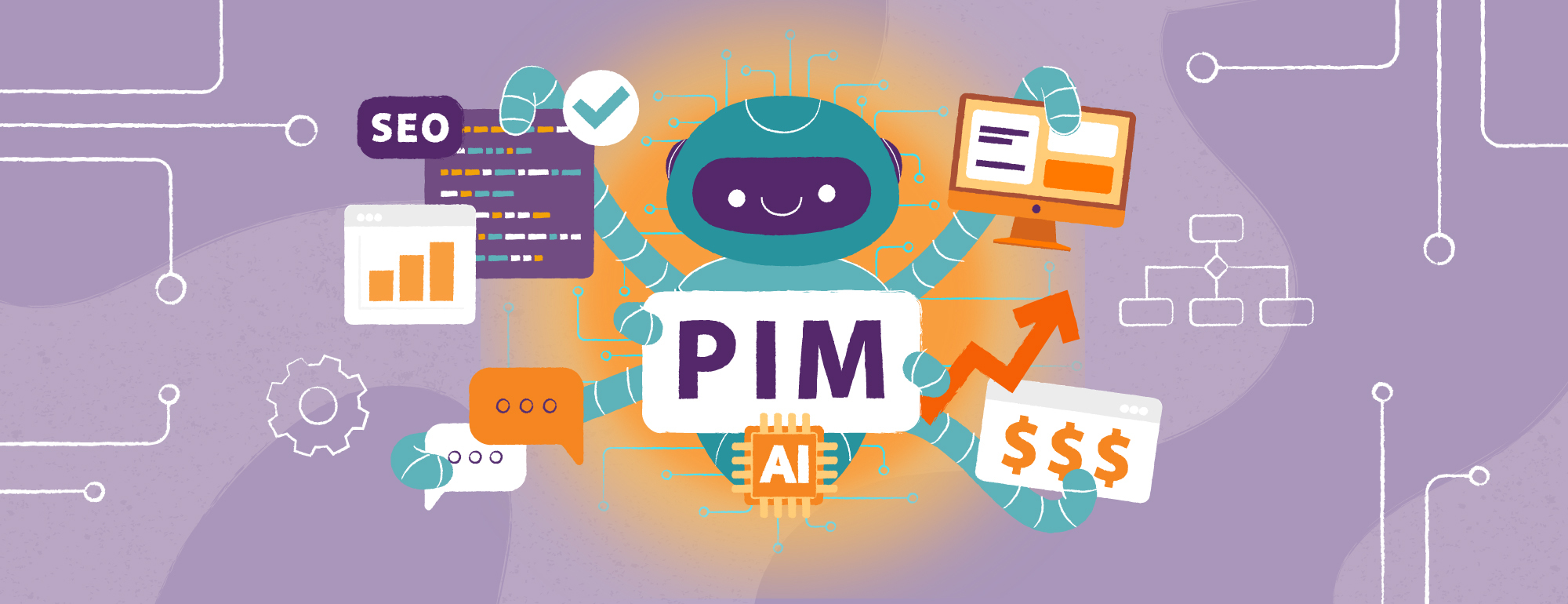PIM + AI = Success / Optimizing PIM Systems With Artificial Intelligence
In today’s rapidly changing business world, managing product information has become one of the key challenges, especially for companies operating across multiple markets. Although artificial intelligence is a hot topic, much of the available material focuses mainly on theory or the distant future. We’re taking it a step further – below, we present our TOP 5 proven AI applications in PIM systems that are ready for implementation right now! What benefits does AI bring to PIM systems? Discover specific solutions our clients are already using and see how they can revolutionize your processes as well.
Automatic Product Description Generation
Manually creating product descriptions is time-consuming, especially for companies managing large catalogs. By integrating the PIM system with AI modules, content generation can be fully automated. AI systems are able to create descriptions based on attributes stored in PIM, such as size, material, color or product purpose.
Automating the generation of descriptions significantly reduces labor costs and saves time – generating a single description takes a few seconds, while manual creation can take several minutes. In addition, with the ability to generate content in multiple languages, translations are faster and cheaper (or even cost-free), making it easier to expand into new markets.
Use Case: An electronics e-commerce platform is using AI to create detailed descriptions for each new smartphone model. Based on the attributes entered, such as processor type, screen resolution and memory capacity, the system generates complete descriptions in just a few seconds. This allows the company to respond more quickly to new launches while maintaining high-quality and consistent content.
Automatic Translation of Descriptions into Multiple Languages
The traditional process of translating product descriptions requires the involvement of specialists and often takes hours or even days. AI modules integrated with PIM systems allow descriptions to be automatically translated into different languages as soon as they are generated in the main language. The system can also take into account local key phrases and language specifics of individual markets, which is crucial in the context of international sales.
Translation automation significantly reduces costs and speeds up the process of deploying new content to foreign markets, which is invaluable for large companies operating in multiple markets simultaneously.
Use Case: The sportswear manufacturer generates product descriptions in Polish and then automatically translates them into, for example, German, French and Italian, taking into account local vocabulary, such as preferred terms for materials or product names. Such translations can be further verified and corrected by local users.
Content Optimization for Better SEO
The integration of PIM systems with AI modules, supported by SEO tools such as SEMRush, makes it possible to automatically consider key phrases as early as the content generation stage. As a result, product descriptions are immediately optimized for search engine visibility. AI systems can analyze changing search trends and provide suggestions for new key phrases tailored to the specifics of a given market. Automated content optimization allows descriptions to be continuously adjusted to changing trends, which increases organic traffic and improves the position of products in search results.
Use Case: The electronics store uses AI to tailor descriptions of products, such as laptops and cameras, for current key phrases. As a result, the descriptions automatically include the phrases that are most frequently searched for by users at any given time, increasing the store’s visibility in search results.
Automatic Content Updates with AI
Changing product specifications, introducing new models or updating parameters is a daily occurrence for many companies. AI modules in PIM systems can automatically detect changes in attributes and update product descriptions across all sales channels. This ensures that any product information is always up-to-date. Automating updates eliminates errors associated with manual changes, saves time and increases the accuracy of product information.
Use Case: An auto parts company is using AI to automatically update descriptions when a manufacturer changes the technical specifications of new models. The system automatically adjusts descriptions on the website and catalogs, ensuring data consistency.
Content and Data Validation with AI
AI can act as an automatic quality checker, verifying the correctness of data entered into the PIM system. Verification includes checking consistency between different fields of a product description, consistency of specifications, and completeness of content. AI can also check that the descriptions contain all the key information needed for a customer to make a purchasing decision.
Use Case: A B2B company in the sanitary industry is using AI to automatically analyze the consistency of technical descriptions. The system checks that specifications are consistent across languages and that each description field is completed, minimizing the risk of errors in key product documents.
Other Applications of AI in PIM Systems
AI also offers other advanced solutions that can be implemented in PIM systems to improve product data management, for example:
- Automatic product categorization: AI systems can automatically assign products to appropriate categories based on attribute analysis, significantly accelerating the process of managing large catalogs.
- Image analysis: AI can analyze product images, automatically assigning attributes such as color, material or shape (e.g., apparel or footwear industry).
- Content customization: AI creates multiple versions of the description for each product, each tailored to the preferences and needs of a specific segment (e.g., younger, older, tech-savvy). When users browse products, the system recognizes their segment based on behavior (e.g., products browsed, preferences) and presents the most appropriate description. This increases user engagement and the likelihood of making a purchase.
Discover the Full Potential of AI in Product Data Management
The use of artificial intelligence in PIM systems opens up new opportunities for companies, allowing significant automation and optimization of processes related to product content management. Thanks to AI, companies can more quickly launch products in new markets, respond dynamically to changes in search trends searches, and ensure consistency and quality of content across all sales channels. sales. Implementing such solutions not only reduces operating costs, but also increases operational efficiency and competitiveness in the market.
The above suggestions for applying AI in PIM systems are solutions that are already being used and implemented at our clients as well. If you are interested in such improvements – feel free to contact the Univio team!







